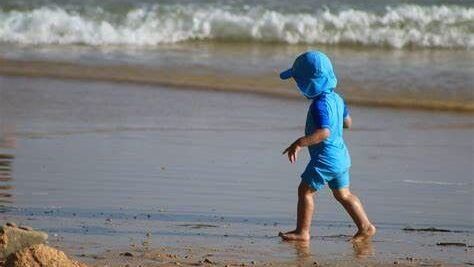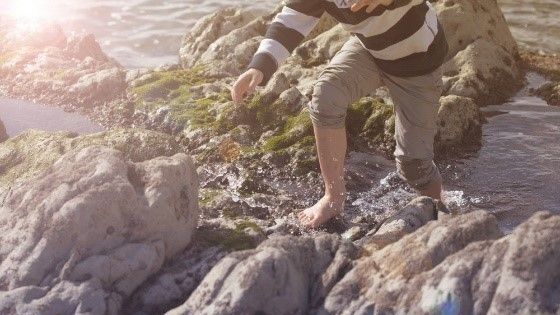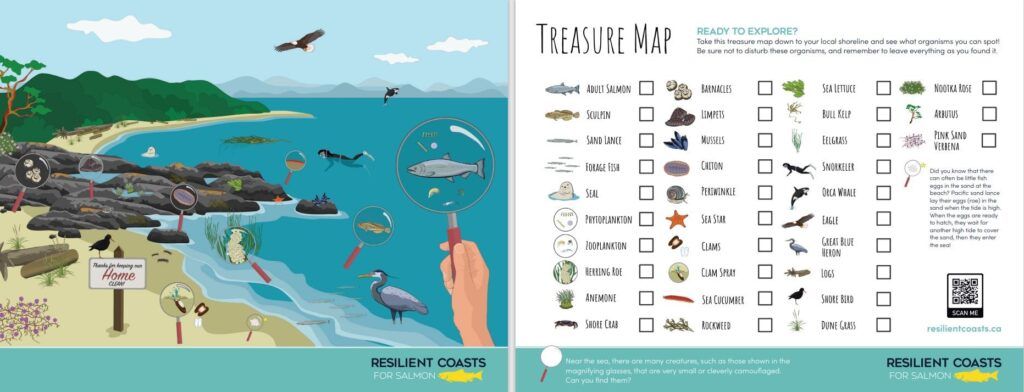Both provide us with much more than just a pretty view. In fact, they offer a variety of ecosystem services that are crucial not only for the environment but for us human folk, too!

Ecosystem services are benefits provided by natural environments and processes. These can include ecological benefits and benefits to people. Most healthy ecosystems provide multiple benefits!
Here are some examples of ecosystem services that shorelines can provide:
You may have thought of the above ecosystem services before, but did you know natural and nature-based shorelines have individual and community health and wellness benefits?
In addition to enhancing coastal resiliency to the effects of climate change, naturally sloped shorelines provide a safer space than seawalls for families, children, and pets. These beaches are a wonderful place for family members of all ages to explore the water’s edge and beyond without fear of toppling into dangerously deep water.

Spending time in nature, whether in urban parks or forest trails, reduces anxiety, increases satisfaction, and improves mental health (1).

However, recent research has suggested that spending time in blue spaces may be even more beneficial than in green spaces. A 2016 study conducted in Wellington, New Zealand, suggested that even spending time within sight of “blue environments,” like the seashore, is associated with lower levels of psychological distress, especially among city dwellers (2).
Walking on sand and pebbles, balancing on logs, climbing boulders, and jumping from stone to stone provide physical health benefits, including improved muscle tone and balance for the young and old alike. Exposure to nature can reduce blood pressure, muscle tension, and stress hormones (3). A day at the seaside is also an excellent opportunity to soak up some vitamin D, which helps to boost your immune system (4). Should your adventures take you into the water, you may also get a mineral boost since trace minerals from seawater can be absorbed through the skin.

Many of the characteristics of natural shorelines that boost our mental and physical health can also benefit our neurological health.

Spending time at the beach has been proven to regulate our nervous system, improve cognitive performance and mental clarity, and enhance creativity (5). Walking on uneven surfaces like pebbles and sand can give your brain novel sensory information, prompting motor learning processes and stimulating neuroplasticity (6).
Whether playing in tidepools or investigating who lives among the grasses, rocks, sands, and shrubs, natural shorelines provide countless opportunities for experiential learning, building social connections, fostering independence, and engaging in sensory play. Since blue spaces have a calming effect on the nervous system, reduce stress and promote relaxation, they can greatly enhance your capacity for attention and engagement (7). Beaches also provide space to closely observe natural rhythms, like the tides, seasons, and life cycles of creatures like Pacific Salmon. People of all ages can benefit from acquiring shoreline knowledge and skills, such as identifying wildlife and foraging for seaweed, mussels, and clams.

So, the next time you're planning a day at the beach, consider the benefits of a natural shoreline. By conserving or restoring these ecosystems, we can protect the environment, enhance recreational opportunities, and improve our well-being

Visit our Kids Corner for fun and educational resources. See how many plants and animals you and your little one can find on your local shoreline with our Treasure Map!